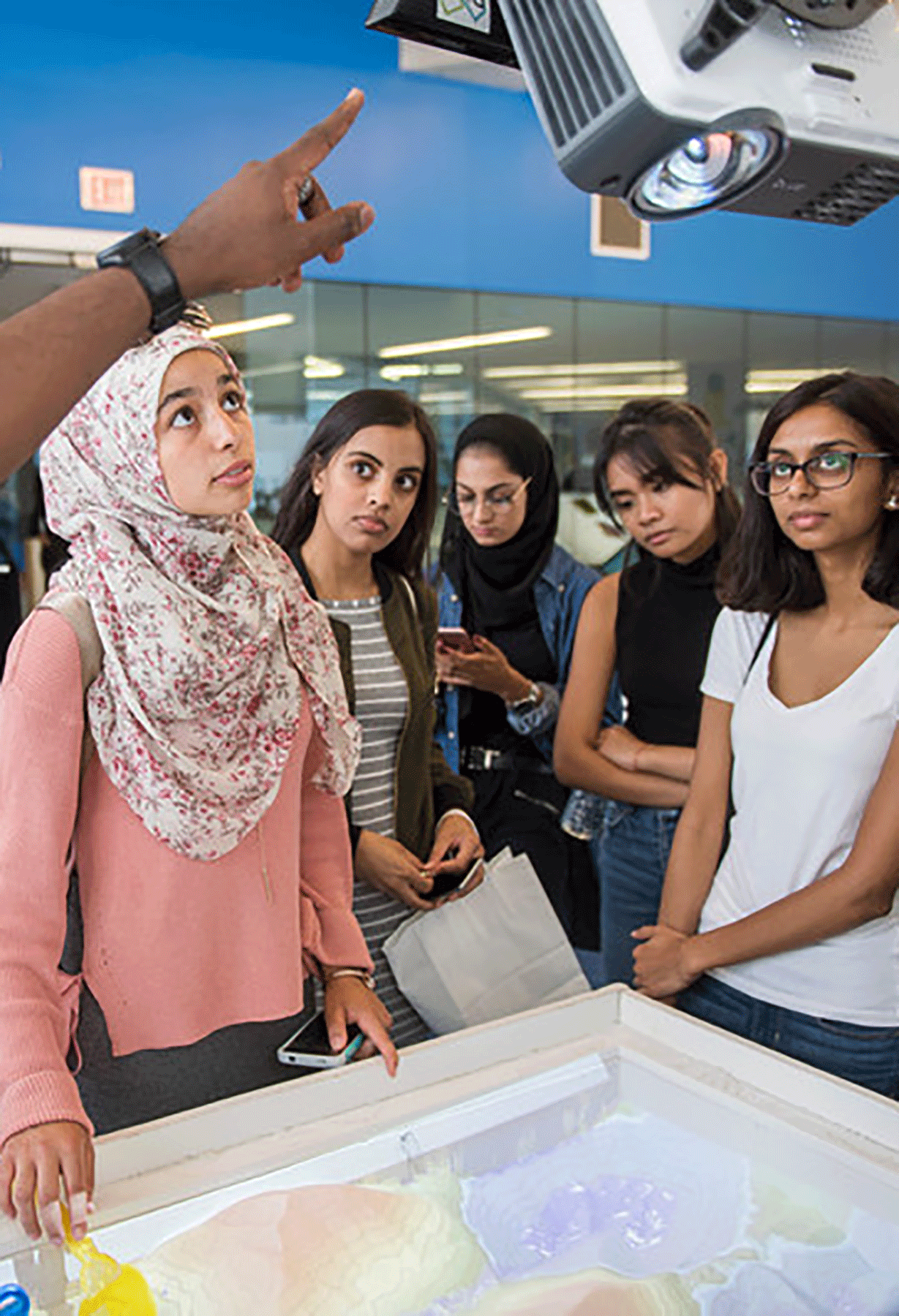Faculty & Staff
Experiential learning (EL) is a hallmark of the University’s education model that emphasizes the relevance and integration of theory and practice. EL is an outcome of an intentionally designed mix of pedagogic and learning strategies that embrace varied approaches, activities and environments.
EL is not merely exposing students to an experience, but rather, it is locating the experience within an intentional learning cycle that leads to the achievement of set learning objectives. It is necessary to note the distinction between active learning, like discussion, role-playing, and group work, and EL. While all EL is active learning, not all active learning is EL. Both practices enrich the student experience, but they are different pedagogical approaches.
Below are EL Hub developed resources and resources found around the University that may help you in the ideation and implementation of your EL opportunity.
What is Experiential Learning?
EL is grounded in an intentional learning cycle, has clearly defined learning outcomes, and engages students actively in creating knowledge and critically reflecting on their experiences. The EL cycle cultivates leadership and interpersonal relationship skills, adaptability and entrepreneurial abilities, and a network of potential future employers for students.
The goal is to provide an education that responds to the rapidly changing world and the need to advance knowledge acquisition and critical judgement; both thinking and doing; reflection and engagement; career development and informed citizenship; growth as an individual, and greater connectivity with the larger community. Ideally, EL helps students achieve these balances in a way that is responsive to the characteristics and needs of their disciplines, fields, and professions.
- Opportunity to integrate theory and practice
- Develop skills, competencies and values that will support them in their career and citizen lives
- Increased academic and career clarity
- Build networks
- Create real-world impact through academic content
- Increased student engagement
- Rewarding experience
- Build networks/partnerships that are based on reciprocity
- Helps keep knowledge and practice current
- Provides an opportunity to evaluate and improve curriculum
- Increases the diversity, energy, and enthusiasm within the organization
- Builds meaningful relationships with the University
- Provides a new perspective to the delivery of programs, services and products
- Attracts and builds a new talent pipeline
"Learning is the process whereby knowledge is created through the transformation of experience. Knowledge results from the combination of grasping and transforming experience."

Do you currently offer EL, or are you considering incorporating an EL opportunity into your curriculum? Our office works diligently to serve as a place for idea creation, knowledge exchange and vision building. We are also responsible for the functional oversight of EL in compliance with the university's Senate Policy 169: Experiential Learning.
Should you have any questions on what is listed below or if you require any additional support, send us an email at experiential@torontomu.ca (opens in new window) .
A leader in EL, LAS works closely with clients to build and deliver live, performance-based simulations that target specific learning objectives, enhance professional development and support a variety of performance assessment models.
The EL Hub hosts CoP gatherings as an opportunity to hear the latest updates on EL, ask and answer questions, and work towards a shared vision.
(google form) EL Hub Resource Portal (external link, opens in new window)
Bookmark the EL Hub Resource Portal (external link, opens in new window) to get quick access to internal EL updates, including past reports on our CoP and implementing best practices and strategies for your EL activities.
Note: This resource is for internal employees only.
EL Approaches at Toronto Metropolitan
This resource introduces the various ways the university integrates EL into the curriculum and helps determine what type of EL you'd like to curate.
Understanding Experiential Learning
Get to know the foundations of EL to support your learning goals and integrate EL into practice.
Kolb’s Experiential Learning Cycle
A primary theory behind EL, psychologist David Kolb's EL Theory and EL Cycle is a mechanism used to differentiate between EL activities and other forms of learning.
MCU Guiding Principles for Experiential Learning
MCU provides guiding principles to reinforce the commitment to providing all students with EL opportunities.
Senate Policy 169 (opens in new window)
Is there a resource you'd be interested in having that isn't listed here? Do you have additional questions? Feel free to contact us at experiential@torontomu.ca (opens in new window) .
Below are Toronto Metropolitan-specific resources at your disposal for collaborating on EL opportunities outside of the EL Hub.

Faculty of Arts’ CELT coordinators assist faculty in brainstorming how community-engaged learning and teaching could be integrated into courses and identify potential projects and relationship building with community partners.
Career Education Specialists ensure that your Faculty has a team dedicated to working with your students, bringing expertise on the diverse career paths and industry trends related to each program of study through tailored sessions, training and employer events.
Advise and assist the Board of Governors and Toronto Metropolitan faculty and staff on policies, laws, governance, privacy, compliance, records management, and risk management to guard and uphold the university’s reputation.
In selecting the appropriate EL activity for students, it is of utmost importance to consider the risks involved for participants. Faculty and staff should assess health, safety, and protocols to mitigate risks identified in the EL setting to protect students, the university, and EL partners. Please consult with the Environmental Health and Safety office for assistance.
As Faculties and supporting units decide to transition EL to digital formats, faculty and instructors are encouraged to consult with a Curriculum Development Consultant for curriculum changes. To ensure that your program or course continues to meet accreditation requirements, please consult with governing entities to share proposed changes and for information on policy changes to accommodate institutions under unique circumstances.
In collaboration with The Chang School, Computing and Communications Services, and the Toronto Metropolitan University Library, the Centre for Excellence in Learning and Teaching has compiled a comprehensive list of resources meant to support faculty and instructors with remote teaching.
The Centre created a comprehensive overview of experiential learning (external link, opens in new window) , what it is, how it works, and how to design EL opportunities.
The RIO manages the university's insurance policies and consults with faculty and staff on risks incurred by the university to facilitate EL and student participation in related activities. This includes the assessment of risks and the development and provision of required risk management documentation and processes as required by this policy.
This office supports the University’s commitment to becoming a leading innovative university with a global reach. It prioritizes providing access to opportunities for transformative global learning, collaborative scholarly research, and creative activity by forming values-driven, ethical, sustainable, and inclusive partnerships to advance community engagement, mutually beneficial forms of innovation, capacity building and global awareness.
Higher Education Quality Council of Ontario (HEQCO) surveyed students who participated in Work Integrated Learning programs and documented outcomes and impact.
Study on Experiential Learning and Pathways to Employment for Canadian youth (external link)
By Universities Canada, see how EL fits into a rapidly changing labour market.
NSEE: Webinars (external link, opens in new window)
The National Society for Experiential Education (NSEE) website is an excellent resource for those looking to use EL as part of learning effectively. Resources include webinars and an online resource library.
This symposium organized by the Quality Council serves as a great resource to see what others are up to in the world of EL.
The WEF future of Job Report (external link, opens in new window)
In the Future of Jobs Report 2018, the World Economic Forum identified the growth of 10 critical skills alongside the decline of others. These critical areas can be strengthened and attained through carefully crafted EL opportunities.
CEWIL Webinar: EDI & WIL: Practitioner Perspectives (external link, opens in new window)
Watch as the panel, including EL’s very own Nikki Waheed, discusses equity, diversity and inclusion within the world of work-integrated learning.
Know of any good resources, upcoming conferences or workshops that you want to share with us? Feel free to send us any resources you think our community could benefit from! We love hearing from you!
“Experiential learning occurs when carefully chosen experiences are supported by reflection, critical analysis and synthesis. Experiences are structured to require the learner to take initiative, make decisions and be accountable for results.”